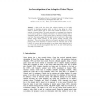Free Online Productivity Tools
i2Speak
i2Symbol
i2OCR
iTex2Img
iWeb2Print
iWeb2Shot
i2Type
iPdf2Split
iPdf2Merge
i2Bopomofo
i2Arabic
i2Style
i2Image
i2PDF
iLatex2Rtf
Sci2ools
104
click to vote
AUSAI
2001
Springer
2001
Springer
An Investigation of an Adaptive Poker Player
: Other work has shown that adaptive learning can be highly successful in developing programs which are able to play games at a level similar to human players and, in some cases, exceed the ability of a vast majority of human players. This study uses poker to investigate how adaptation can be used in games of imperfect information. An internal learning value is manipulated which allows a poker playing agent to develop its playing strategy over time. The results suggest that the agent is able to learn how to play poker, initially losing, before winning as the players strategy becomes more developed. The evolved player performs well against opponents with different playing styles. Some limitations of previous work are overcome, such as deal rotation to remove the bias introduced by one player always being the last to act. This work provides encouragement that this is an area worth exploring more fully in our future work.
Related Content
| Added | 28 Jul 2010 |
| Updated | 28 Jul 2010 |
| Type | Conference |
| Year | 2001 |
| Where | AUSAI |
| Authors | Graham Kendall, Mark Willdig |
Comments (0)

